On Wednesday, Columbia once again closed its gates to non-affiliates as students from across campus gathered at Low as part of a National Walkout for Gaza. At the same time, so-called “doxing trucks” appeared on campus, bearing the names and faces of current students. Later that day, a second protest, “End Jew-Hatred on Campus,” mounted outside of Columbia’s main gates.
On Wednesday, October 25, Columbia’s campus prepared for the National Walkout for Gaza. The demonstration, organized by Columbia Students for Justice in Palestine (SJP), Barnard/Columbia Jewish Voice for Peace (JVP), and several other student organizations, saw Columbia students join universities and colleges across the nation demanding, as the organizers described, “immediate end to the siege and genocide in Gaza.”
Ahead of the demonstration, NYPD officers were stationed in front of gates on Columbia’s Morningside Heights campus. Two days after Columbia reopened its secondary gates, previously closed due to prior demonstrations, campus access was again limited to Barnard and Columbia ID holders. NYPD officers were also present along metal barricades at the 116th and Broadway College Walk entrance.
The Walkout
From 1 to 3 pm, hundreds of students gathered around Alma Mater. Participants waved Palestinian flags and held signs bearing phrases such as “Viva Palestina,” “Divest from apartheid,” “Ceasefire now,” and “From the river to the sea.” Many wore keffiyehs—traditional Palestinian headdresses that symbolize resistance, perseverance, and unity—and face masks to prevent doxing. Prior to the walkout, SJP had already sold several rounds of keffiyehs in order to provide facial coverage and display solidarity. The money raised was directed towards relief efforts in Gaza.
During the demonstration on Low Steps, representatives from SJP and JVP reiterated demands for Columbia to “divest from companies complacent in Israeli apartheid.” The groups also demanded the University cancel the opening of its Tel Aviv Global Center, which will not be accessible to any Palestinians per Israeli policies, and emphasized that “students of Columbia University have a moral obligation to engage in the University’s past, present, and future.”
Speakers from SJP condemned the gates’ closure as “a major inconvenience and an unnecessary restriction to our freedom,” likening these restrictions to the Israeli government’s use of checkpoints and roadblocks in Gaza and the West Bank to restrict Palestinian movement.
A few counter-protestors demonstrated along the Low Step ledges with Israeli flags. One of the protestors had a megaphone; during periods of quiet from the SJP crowd, they made statements such as “When I say free Gaza, you say: fuck Hamas!” This, and other remarks such as “Hamas is ISIS,” was met with boos from the SJP-affiliated crowd.
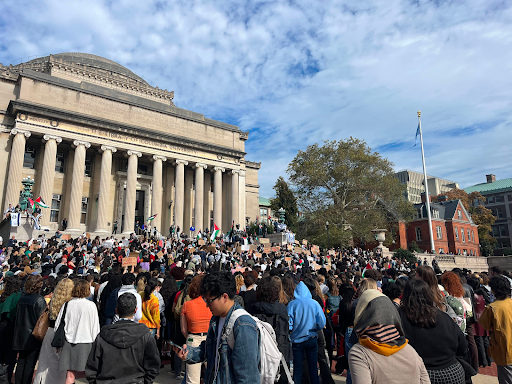
Call To Action
Speakers from Columbia Law School, SJP, JVP, Columbia School of Social Work Abolition Caucus, Native American Council, and the Black Students’ Organization, as well as non-SJP-affiliated Palestinians delivered speeches in solidarity.
The first SJP speaker criticized the University for failing to, as they described, equally recognize the suffering and humanity of Palestinian people. An SJP speaker called Shafik’s most recent statement “one-sided” wherein she did not mention Palestine by name, stating Palestinian students felt “alienated and isolated.”
A speaker from the Black Students’ Organization voiced BSO’s solidarity with Palestinian liberation “to the end.” The speaker emphasized that “all of our histories are intersecting,” pointing to the concurrent unfolding of violence across time and space. “From slavery in the United States and Latin America to the ethnic cleansing in Palestine, none of this,” they said, “is an isolated incident.”
The SJP representative then recalled past activism by Columbia’s student body, spearheaded by Columbia University Apartheid Divest, that resulted in a referendum vote on divestment by the Columbia College Student Council.
In November 2019, after years of student advocacy, the Columbia College Student Council (CCSC) agreed to hold a referendum that spring on whether the University should “divest from companies profiting from or otherwise supporting Israeli policy toward the Palestinian people.” Of the 1,771 students who voted, over 60% of the students voted in favor of divestment. Despite the vote, the University did not change its investment policies.
The history of student activism against apartheid at Columbia stretches even further. In the 1980s, Columbia students formed the Coalition for a Free South Africa (CFSA) advocated fiercely—and successfully—to the Board of Trustees for divestment from corporations that operated in Apartheid South Africa. A speaker recounted a 1985 hunger strike by students occupying Hamilton Hall as an example of previous student activism.
As an SJP speaker concluded their speech, participants echoed chants, including, “Do not tell us divestment is impossible, Columbia has done it before!” and “We want justice, you say how. / Brick by brick, wall by wall, apartheid has to fall. / Not a penny, not a dollar, we won’t pay for any more slaughter.”
Doxing Trucks
Before the walkout began, several trucks appeared around both of Columbia’s main entrances, bearing the names and faces of students under the words “Columbia’s Leading Antisemites.” The students doxed by the truck were largely members of campus organizations such as CU Muslim Students Association, Conflict Resolution Collective, SIPA’s Palestine Working Group, and SIPA’s Human Rights Working Group. Accuracy in Media, a conservative watchdog organization that claims to “use investigative journalism and citizen activism to expose media bias,” took responsibility for the vehicles, which also appeared on Harvard’s campus on October 12.
Members of the Columbia community responded by surrounding the truck, covering up the names and images of students with balloons, umbrellas, and sheets.
On Thursday morning, Barnard College Dean Leslie Grinage and Senior Vice President of Strategic Finance & Operations Sarah Gillman stated in an email to students, “doxxing is an unacceptable practice that threatens the safety of our community.” Grinage and Gillman also encouraged students to file a complaint with the NYPD if they found themselves on one of the “doxxing trucks,” and advised students and staff to remove their personal information from the Columbia Directory. However, they also said that the NYPD could not remove the trucks from public streets unless they were parked illegally, and encouraged students who saw any illegally-parked vehicles to call 311. Later that day, Columbia’s Associate Dean of Multicultural Affairs Melinda Aquino contacted students to share anti-doxing resources, including a guide to protecting oneself from doxing and an “Anti-Doxing Guide for Activists,” among others. She also revealed that Multicultural Affairs and Religious Life would host a gathering space from 6 to 7 pm on Thursday, October 26, in Earl Hall Auditorium.
Later That Day
Around 5:30 pm, after the National Walkout for Gaza demonstration had largely cleared, a second demonstration, called “End Jew-Hatred On Campus,” began just outside of Columbia’s main gates on 116th and Broadway. Students and non-affiliates gathered along Broadway, chanting “bring them home,” seemingly referring to the Israeli hostages taken by Hamas, and holding Israeli flags and signs that read “End Jew-Hatred” and “Never Again.” Though the demonstration was promoted on campus by Students Supporting Israel (SSI), the group said on Instagram that it was not responsible for organizing the event. On social media, SSI shared posters advertising the demonstration that invited students to “come stand in solidarity with Columbia University students and students nationwide that are being subjected to Jew-hatred!” Though the demonstration did not appear to move inside Columbia’s gates, the increased police presence remained in the area, with multiple NYPD vans and unidentified helicopters spotted along and above the surrounding street.
Photos via Bwog Staff


 3 Comments
3 Comments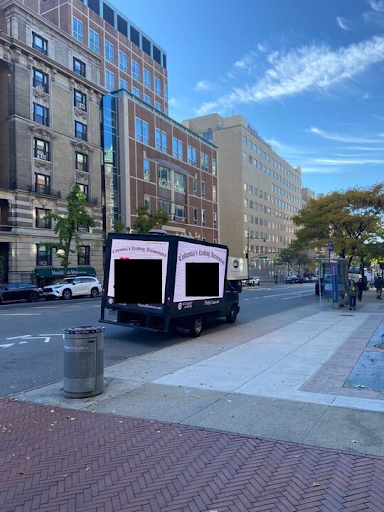
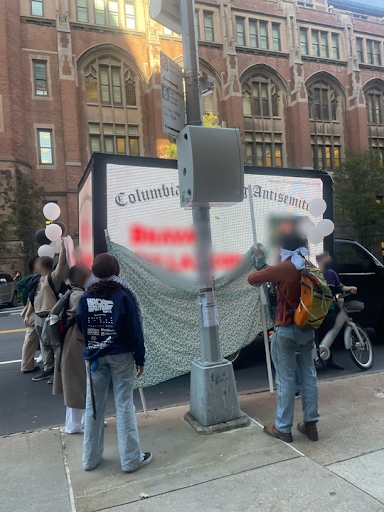
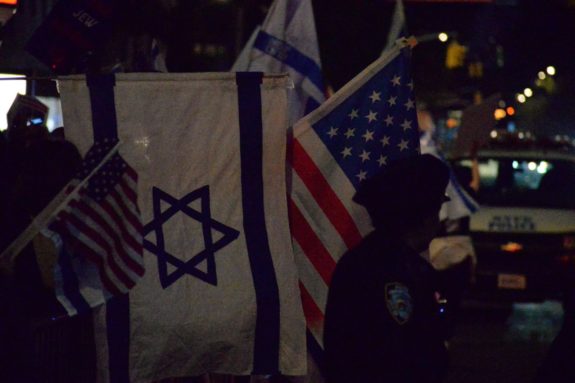
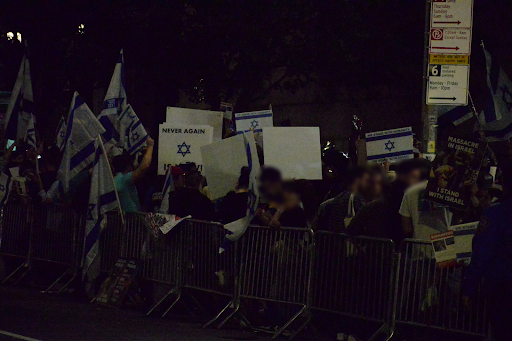

3 Comments
@Anonymous admin not doing anything about the doxing trucks is insane. what happened to freedom of speech & protecting students????
@Anonymous The school doesn’t control the streets outside the school.
@Anonymous Why is Bwog censoring comments? These articles would normally be filled with comments, so it’s obvious things are being manipulated.